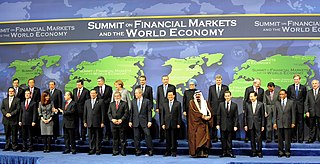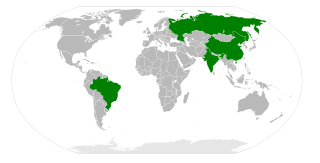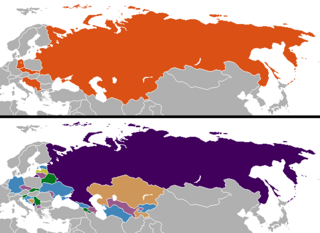Superpower describes a state or supranational union that holds a dominant position characterized by the ability to exert influence or project power on a global scale. This is done through the combined means of economic, military, technological, political, and cultural strength as well as diplomatic and soft power influence. Traditionally, superpowers are preeminent among the great powers. While a great power state is capable of exerting its influence globally, superpowers are states so influential that no significant action can be taken by the global community without first considering the positions of the superpowers on the issue.
The category of newly industrialized country (NIC), newly industrialized economy (NIE) or middle income country is a socioeconomic classification applied to several countries around the world by political scientists and economists. They represent a subset of developing countries whose economic growth is much higher than that of other developing countries; and where the social consequences of industrialization, such as urbanization, are reorganizing society.
In international relations, power is defined in several different ways. Material definitions of state power emphasize economic and military power. Other definitions of power emphasize the ability to structure and constitute the nature of social relations between actors. Power is an attribute of particular actors in their interactions, as well as a social process that constitutes the social identities and capacities of actors.

A great power is a sovereign state that is recognized as having the ability and expertise to exert its influence on a global scale. Great powers characteristically possess military and economic strength, as well as diplomatic and soft power influence, which may cause middle or small powers to consider the great powers' opinions before taking actions of their own. International relations theorists have posited that great power status can be characterized into power capabilities, spatial aspects, and status dimensions.

A Middle power is a state that is not a superpower or a great power, but still exerts influence and plays a significant role in international relations. These countries often possess certain capabilities, such as strong economies, advanced technologies, and diplomatic influence, that allow them to have a voice in global affairs. Middle powers are typically seen as bridge-builders between larger powers, using their diplomatic skills to mediate conflicts and promote cooperation on international issues.

In international relations, regional power, since the late 20th century has been used for a sovereign state that exercises significant power within its geographical region. States that wield unrivaled power and influence within a region of the world possess regional hegemony.
An emerging market is a market that has some characteristics of a developed market, but does not fully meet its standards. This includes markets that may become developed markets in the future or were in the past. The term "frontier market" is used for developing countries with smaller, riskier, or more illiquid capital markets than "emerging". As of 2006, the economies of China and India are considered to be the largest emerging markets. According to The Economist, many people find the term outdated, but no new term has gained traction. Emerging market hedge fund capital reached a record new level in the first quarter of 2011 of $121 billion. Emerging market economies’ share of global PPP-adjusted GDP has risen from 27 percent in 1960 to around 53 percent by 2013. The ten largest emerging economies by nominal GDP are 4 of the 9 BRICS countries along with Mexico, South Korea, Indonesia, Turkey, Saudi Arabia, and Poland. The inclusion of South Korea, Poland, and sometimes Taiwan are questionable given they are no longer considered emerging markets by the IMF and World Bank If we ignore those three, the top ten would include Argentina and Thailand.

BRIC is a term describing the foreign investment strategies grouping acronym that stands for Brazil, Russia, India, and China. The separate BRICS organisation would go on to become a political and economic organization largely based on such grouping.

The G20 or Group of 20 is an intergovernmental forum comprising 19 sovereign countries, the European Union (EU), and the African Union (AU). It works to address major issues related to the global economy, such as international financial stability, climate change mitigation and sustainable development.

Chindia is a portmanteau that refers to both China and India collectively. China and India share long borders, are both regarded as growing countries and are both among the fastest growing major economies in the world. Together, they account for over one-third of the world's population. According to BRICS, China and India are both countries with high potential to become a global superpower.

The Indian Century is a neologism suggesting that the 21st century will be dominated by India, as the 20th century is often called the American Century, and the 19th century as Pax Britannica, as the 17-18th centuries dominated by France and the 15-16th centuries dominated by Spain. The phrase is used particularly in the assertion that the economy of India could overtake the economy of the United States and economy of China as the largest national economy in the world, a position it held from 1 to 1500 CE and from 1600 to 1700 CE.

A potential superpower is a state or other polity that is speculated to be or have the potential to become a superpower, a state or supranational union that holds a dominant position characterized by the ability to exert influence or project power on a global scale through economic, military, technological, political, and/or cultural means.

Terence James O'Neill, Baron O'Neill of Gatley is a British economist best known for coining BRIC, the acronym that stands for Brazil, Russia, India, and China—the four once rapidly developing countries that were thought to challenge the global economic power of the developed G7 economies. He is also a former chairman of Goldman Sachs Asset Management and former Conservative government minister.
A maritime power is a nation with a very strong navy, which often is also a great power, or at least a regional power. A maritime power is able to easily control their coast, and exert influence upon both nearby and far countries. A nation that dominates the world navally is known as a maritime superpower. Many countries that become maritime powers become strong to defend themselves from an extant threat, as the USSR did during the Cold War to defend itself from the United States Navy. In that scenario, it is common for the emerging maritime power to focus largely upon area denial tactics, rather than power projection.

CIVETS is an acronym for six emerging market countries identified for their rapid economic development: Colombia, Indonesia, Vietnam, Egypt, Turkey, and South Africa. The term was coined in 2009 by Robert Ward of the Economist Intelligence Unit to describe nations demonstrating particularly strong growth potential. Common characteristics include "diverse and dynamic" economies, "young, growing population[s]", and "relatively sophisticated financial systems".

BRICS is an intergovernmental organization comprising Brazil, Russia, India, China, South Africa, Iran, Egypt, Ethiopia, and the United Arab Emirates. Originally identified to highlight investment opportunities, the grouping evolved into a cohesive geopolitical bloc, with their governments meeting annually at formal summits and coordinating multilateral policies since 2009. Bilateral relations among BRICS are conducted mainly on the basis of non-interference, equality, and mutual benefit.

The post–Cold War era is a period of history that follows the end of the Cold War, which represents history after the dissolution of the Soviet Union in December 1991. This period saw many former Soviet republics become sovereign nations, as well as the introduction of market economies in eastern Europe. This period also marked the United States becoming the world's sole superpower.












